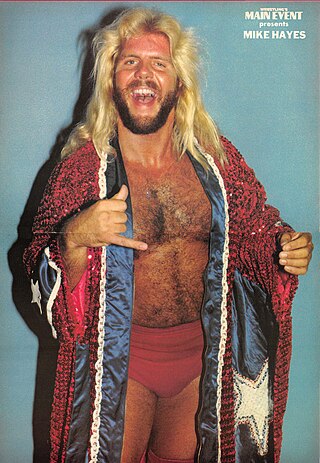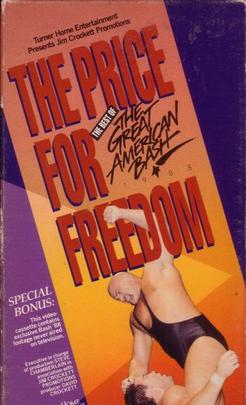
The National Wrestling Alliance (NWA) is an American professional wrestling promotion and governing body owned by Billy Corgan and operated by its parent company Lightning One, Inc.

Jim Crockett Promotions is a family-owned professional wrestling promotion headquartered in Charlotte, North Carolina, United States. Founded in 1931, the promotion emerged as a cornerstone of the National Wrestling Alliance (NWA). By the 1980s, Jim Crockett Promotions was, along with the World Wrestling Federation, one of the two largest promotions in the United States. The Crockett family sold a majority interest in the promotion to Turner Broadcasting System, resulting in the creation of World Championship Wrestling (WCW) in 1988. In 2022, Jim Crockett Promotions Inc. was restarted by Jim Crockett's son and Jim Crockett Jr's brother, David Crockett.

The Universal Wrestling Federation was a 1986 re-branding of wrestler-turned-owner Bill Watts' Mid-South Wrestling promotion. Watts' goal was to elevate his promotion from a relatively smaller, regional-level business, to a national-level rival of the World Wrestling Federation. However, Watts' business strategy quickly swung from "overnight" success to catastrophic failure, resulting in the 1987 sale of the UWF to another rival: Jim Crockett Promotions. The promotion began as an NWA territory, NWA Tri-State, founded by Leroy McGuirk in the 1950s. Tri-State/Mid-South/UWF promoted in Oklahoma, Arkansas, Louisiana and Mississippi until 1987.

Alan Robert Rogowski, better known by the ring name Ole Anderson, was an American professional wrestler, booker, and promoter.

Robert Bradley James was an American professional wrestler, better known by his ring name, Brad Armstrong. He is best known for his appearances with the promotion World Championship Wrestling in the 1990s. He was the son of wrestler "Bullet Bob" Armstrong and brother to professional wrestlers Steve, Scott and Brian.

Michael Seitz is an American retired professional wrestler and former musician. Seitz is best known for leading The Fabulous Freebirds under the ring name Michael "P.S." Hayes and for his role as an announcer under the name "Handsome" Dok Hendrix in the World Wrestling Federation (WWF). He is currently employed with WWE as Vice President, Creative Writing & Booking and is also a senior producer.

Clash of the Champions is an American series of professional wrestling television specials that were produced by World Championship Wrestling (WCW) and Jim Crockett Promotions (JCP) in conjunction with the National Wrestling Alliance (NWA). The specials were supercards comprising pay-per-view caliber matches, similar to the World Wrestling Federation's Saturday Night's Main Event series. The Clash of the Champions shows were famous for typically not airing commercials during matches even though many of these matches lasted 20 minutes or more.
The NWA United States Tag Team Championship was a professional wrestling tag team championship contested for previously in the United States–based Jim Crockett Promotions (JCP), World Championship Wrestling (WCW) promotions, with the title now in current use by the National Wrestling Alliance (NWA). The title is only contestable by male tag teams and in tag team matches. In 1986, NWA President and JCP owner Jim Crockett, Jr. introduced the championship to replace and consolidate the old NWA Mid-Atlantic and Georgia National titles, under the name "NWA United States Tag Team Championship", by announcing a tournament for the newly created title, which was won by Krusher Khruschev and Ivan Koloff on September 28, 1986.

The NWA National Heavyweight Championship is a professional wrestling championship owned and promoted by the U.S.-based, National Wrestling Alliance (NWA).

Georgia Championship Wrestling is an American professional wrestling promotion based in Atlanta, Georgia. The promotion was affiliated with what had been the world's top sanctioning body of championship titles for decades before, the National Wrestling Alliance (NWA), and ran live wrestling shows throughout its geographic "territory" of Georgia. The company was also known for its self-titled TV program, which aired on Atlanta-based superstation WTBS from the 1970s until 1984 when its timeslot was purchased by the World Wrestling Federation.

WCW Saturday Night was an American weekly Saturday night television show on TBS that was produced by World Championship Wrestling (WCW). Launched in 1971 initially by Georgia Championship Wrestling, the program existed through various incarnations under different names before becoming WCW Saturday Night in 1992. Although initially the anchor show of the Turner Broadcasting-backed wrestling company, the September 1995 premiere of WCW Monday Nitro airing on sister station TNT usurped the show's once preeminent position in the company, as the primary source of storyline development and pay-per-view buildup.

The Big Gold Belt is a historic professional wrestling championship belt that has represented titles in multiple promotions throughout its history.

In American professional wrestling, the term Black Saturday refers to Saturday, July 14, 1984, the day when Vince McMahon's World Wrestling Federation took over the timeslot on Superstation WTBS that had been home to Georgia Championship Wrestling (GCW) and its flagship weekly program, World Championship Wrestling, for twelve years. McMahon's purchase led to a longstanding rivalry between himself and WTBS owner Ted Turner, who later bought GCW's successor on the network Jim Crockett Promotions (JCP) and formed his own company under the World Championship Wrestling (WCW) name.

WCW Main Event, originally NWA Main Event, is an American televised wrestling program of World Championship Wrestling (WCW) that aired from April 3, 1988 to January 3, 1998. For most of its run, it was the promotion's secondary show and aired on Sunday evenings on TBS. The show originally aired in 1988 as NWA Main Event. The rights to WCW Main Event now belong to WWE.

WCW Pro was an American televised wrestling show that was presented by World Championship Wrestling (WCW). Along with WCW WorldWide, it was part of the WCW Disney tapings. The rights to WCW Pro now belong to WWE and 161 episodes of Mid-Atlantic Championship Wrestling are available for streaming on NBCUniversal's Peacock in the United States and the WWE Network in international markets.

Best of World Championship Wrestling is an hour-long show, that was the Sunday evening edition of TBS' Saturday night wrestling shows, Georgia Championship Wrestling and NWA World Championship Wrestling. The rights to Best of World Championship Wrestling now belong to World Wrestling Entertainment (WWE).

The 1980s professional wrestling boom, more commonly referred to as the Golden Era or the Rock 'n' Wrestling Era, was a surge in the popularity of professional wrestling in the United States and elsewhere throughout the 1980s. The expansion of cable television and pay-per-view, coupled with the efforts of promoters such as Vince McMahon, saw wrestling shift from a system controlled by numerous regional companies to one dominated by two nationwide companies: McMahon's World Wrestling Federation and Ted Turner's World Championship Wrestling (WCW). The decade also saw a considerable decline in the power of the National Wrestling Alliance (NWA), a cartel which had until then dominated the wrestling landscape, and in the efforts to sustain belief in the kayfabe of wrestling.
The Jim Crockett Sr. Memorial Cup Tag Team Tournament is a professional wrestling event produced annually by the professional wrestling promotion, National Wrestling Alliance (NWA). The event features a tag team professional wrestling tournament with the Crockett Cup awarded to the winning tag team.

The 1988 Great American Bash was the fourth annual Great American Bash professional wrestling event produced by the National Wrestling Alliance's (NWA) Jim Crockett Promotions (JCP). It was the first Great American Bash event to air on pay-per-view (PPV), as the previous events aired on closed-circuit television. The event took place on July 10, 1988, at the Baltimore Arena in Baltimore, Maryland. This was the final NWA event produced by JCP and the third and final NWA event to be produced as a pay-per-view, as JCP was purchased by Turner Broadcasting System in November 1988 and was rebranded as World Championship Wrestling (WCW). This was also the first Pay Per View produced under the Turner Home Entertainment banner as the other two events were produced by The Wrestling Network.

The First Annual Jim Crockett Sr. Memorial Cup Tag Team Tournament, also referred to as Crockett Cup (1986), was held on April 19, 1986 at the Louisiana Superdome in New Orleans, Louisiana. The first portion of the event was held in the afternoon and the second portion was held in the night. The event was co-promoted by Jim Crockett Promotions (JCP) and Universal Wrestling Federation (UWF). The tournament featured 24 tag teams. The concept of the Crockett Cup was a single elimination tag team tournament, with the storyline prize of $1,000,000.00 given to the winning team along with a large trophy. The tournament was won by The Road Warriors, as they defeated Ron Garvin and Magnum T. A. in the finals to win the tournament.


















